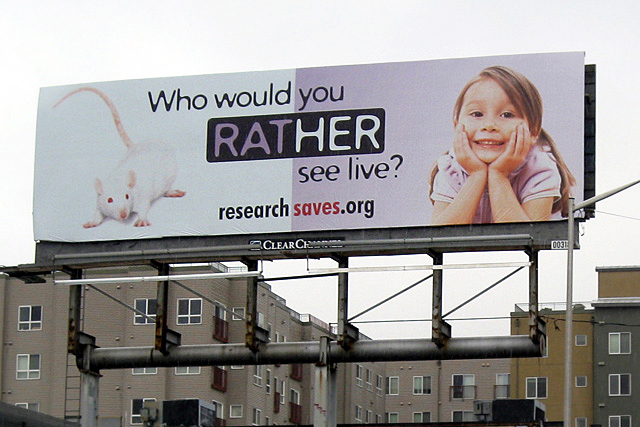Angelenos all over are being asked a rhetorical yet controversially simple question ““ would you rather see a mouse or a little girl live?
In an effort to spread education about and advocate for animal research, the Foundation for Biomedical Research launched a billboard campaign and seems to have resorted to relying on shock value to convey its message.
The question posed is grossly simplistic of a heavily nuanced and complicated issue, but it is germane when we consider the equally narrow and pathos-appealing tactics of animal rights groups.
Hopefully, the campaign will help substantiate the idea that meaningful engagement with an issue so laden with philosophical and scientific concerns is needed for the public. If there are real hopes in reaching the world beyond laboratories, academic writings, isolated protests and low-budget films, maybe people need to be jolted into the discussion.
Not that there haven’t been such efforts on this campus. UCLA researchers have founded organizations like Pro-Test for Science and have held forums, but this new campaign is an alternative and effective approach.
“I think the shock value is intentional and ironic. … We all know this is more complicated,” said J. David Jentsch, UCLA psychology professor and researcher.
The fact that we easily recognize that complication means that these billboards can evoke the important need for a discourse, because this issue is layered and often misunderstood.
Whatever the tactics are from either side of the debate, many of us are ill-informed on how animals are used for research.
It’s incredibly important to note that veterinarians and husbandry specialists are among those who regulate the standards of research involving animals, that the many alternatives found over the years have been advocated by the scientists who discovered them ““ not animal rights groups ““ and that animal research often saves other disease-ridden animals as well.
I was a vegetarian for 11 years. I also have a bird, a dog and a turtle, so it’s pretty safe to say I like animals. But however strong my feelings for other species may be, I can recognize the fantastic gains that animal research has enabled in the medical and scientific fields.
At UCLA alone, the use of laboratory animals has allowed researchers to find breakthrough medications for fighting breast cancer, Parkinson’s disease, schizophrenia, childhood blindness and many other ailments and syndromes. Eliminating animal research is not only unfeasible, but it would also have a direct, negative impact on the viability of millions.
And yet animal rights groups often paint a one-dimensional picture of why humans should have no special rights. The most infamous expression of this idea comes from the People for the Ethical Treatment of Animals president herself, Ingrid Newkirk, when she said “A rat is a pig is a dog is a boy.” Or worse, groups criminally harass researchers as if fear tactics will truly have an impact on whether research will be performed.
There are, of course, groups that are not extremist in this way, but the threats and firebombings that UCLA researchers endured last year and in years past are definitely not isolated incidents.
The sometimes dangerous tactics of animal rights groups haven’t been forgotten, and now the Foundation seems to be responding.
So yes, the billboard’s question does falsely differentiate between people who care for the welfare of animals and those who care for the welfare of humans, but only to mock the similar ways in which some activists present the issue.
As fellow columnist Asad Ramzanali wrote last year, it would be more worthwhile for those not disfavoring animal research to partake in applicable and realistic efforts, like working to widen legislation or to make sure more laboratories are accredited as well as the ones we have here.
As it is, there is already much effort in the field to only use animal research when seen as absolutely necessary.
“Is this experiment going to cause the least harm to alleviate the most harm? That balance is addressed every single day,” Jentsch said.
A world in which no animals would have to endure any discomfort is undoubtedly ideal. Those in the field are consistently trying to achieve that, but until then, the Foundation is making an interesting effort to spark engagement. As a member, UCLA is alongside that effort.
Think the new billboards are
distasteful? Email Moradi at
imoradi@media.ucla.edu. Send general comments to
opinion@media.ucla.edu.
